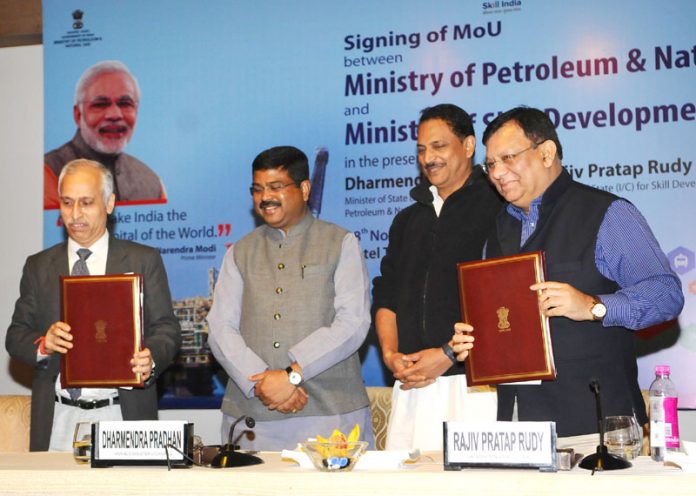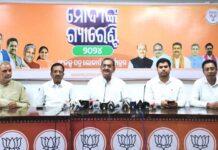
By Our Correspondent
NEW DELHI:The Ministry of Petroleum & Natural Gas (MoPNG) and Ministry of Skill Development & Entrepreneurship (MSDE) here signed a Memorandum of Understanding (MoU) to scale up skill development initiatives in the Hydrocarbon and allied sectors among other areas of cooperation.
The MoU was signed by Secretary MSDE Rohit Nandan and Secretary, MoPNG K. D. Tripathi in the presence of Minister of State (Independent Charge), Ministry of Petroleum & Natural Gas Dharmendra Pradhan and Minister of State (Independent Charge) for Skill Development & Entrepreneurship Rajiv Pratap Rudy.
Speaking on the occasion,Pradhan said as his ministry is gearing up for new avenues that Petroleum and Natural Gas sector will open up for the country, there is tremendous focus on sourcing skilled workforce to make all plans successful.
The partnership with MSDE through this MoU signing will help MoPNG to develop the ready workforce for Exploration and Production, Pipeline & Transportation, Refinery & Marketing and Service providers going forward. He said, in this way, we are investing back into our sector’s and the country’s brighter future.
Welcoming contribution from the hydrocarbon sector, Rajiv Pratap Rudy said, the hydrocarbon sector has tremendous potential for employment generation, and hence it is vital to develop a skilled workforce to meet both current and future needs. The setting up of the Hydrocarbons SSC is the first step in that direction. He said, with today’s partnership, both Ministries commit to develop globally benchmarked workforce for the sector so that lakhs of youth can aspire for better economic opportunities through skill development programs.
MoPNG has now formally joined hands with MSDE to:Develop comprehensive skill development plans for existing and potential workforce in alignment with National Skills Qualification Framework (NSQF).
Certify existing workforce in the hydrocarbon sector for Recognition of Prior Learning under Pradhan Mantri Kaushal Vikas Yojana (PMKVY).Promote and scale-up apprenticeship training under National Apprenticeship Promotion Scheme.Facilitate the setting-up of Skill Development Institutes/Centres of Excellence for vocational training to meet sectoral needs.
MoPNG has setup the Hydrocarbons Sector Skill Council (HSSC) with representatives from the Government, PSUs and private sector to address the skill development needs across the value chain of the sector.
Under the MoU, MoPNG will continue to support the growth of the Hydrocarbon Sector Skill Council and align with the NSQF for skill development programs.
Additionally, MoPNG will encourage Oil & Gas Companies and related contractors to hire skilled personnel, incentivize skill training & certification, promote apprenticeship programs, undertake Recognition of Prior Learning (RPL) programs in the sector and setup institutes focused on various sub-sectors and allied trades.
MoPNG will catalyse these initiatives in the Hydrocarbon sector, through its various agencies and PSUs, and develop a plan in close alignment with the Skill India mission.MSDE would primarily discharge its responsibilities through Directorate General of Training (DGT) and National Skill Development Corporation (NSDC).
Meanwhile, in another development, the Minister of State (I/C) for Petroleum & Natural Gas Dharmendra Pradhan informed the Lok Sabha in a written reply that in order to harness Coal Bed Methane (CBM) potential in the country, the Government of India formulated a policy in 1997 wherein CBM (being natural gas) is explored and exploited under the provisions of Oil Fields (Regulation & Development) Act 1948 and Petroleum and Natural Gas Rules, 1959 and administered by Ministry of Petroleum and Natural Gas.
CBM blocks were carved out by Directorate General of Hydrocarbon (DGH) in consultation with Ministry of Coal (MoC) and Central Mine Planning and Design Institute (CMPDI). Till date, 33 CBM blocks have been awarded in four rounds of CBM bidding, which covers 16,613 sq. km. (64 %) of the total available coal bearing area (26,000 sq. km.) in 12 states of India viz. Andhra Pradesh, Chhattisgarh, Gujarat, Jharkhand, Madhya Pradesh, Maharashtra, Assam, Odisha, Rajasthan, Tamil Nadu, Telangana and West Bengal.
Total prognosticated CBM resource for 33 awarded CBM blocks is about 62.4 TCF (1767.06 BCM), of which so far, 9.9 TCF (280.36 BCM) has been established as Gas-In-Place (GIP). Current production (March 2016) is 1.637 MMSCMD from 4 CBM blocks.
Under the National Biogas and Manure Management Programme (NBMMP), State Nodal Agencies/State Nodal Departments/Khadi and Village Industries Commission are setting up Family Type Bio-Gas Plants. Installation of biogas plants to help in generation of clean gaseous fuel (Methane Gas) for cooking and simultaneously provide enriched organic bio-manure as by product for increasing farm productivity and improving soil health.
To promote the use of Bio-gas to run vehicles, Ministry of Road Transport and Highways has issued a notification no. G.S.R. 498(E) dated 16th June, 2015 providing the standard of Bio-CNG as alternate composition of the compressed Natural Gas for use in vehicles.
Pradhan informed the Lok Sabha in a written reply that during the Urja Sangam held on 27th March, 2015, Hon’ble Prime Minister assigned the target of reducing import dependency in energy by 10% by 2021-22. A committee was constituted for “Preparing a roadmap to reduce the dependency on import in energy by 10% by 2021-22”.
The Committee has submitted its report which envisages a five pronged strategy (Increasing domestic production, promote bio fuels and renewable, promote energy efficiency and conservation, improvement in refining processes and demand substitution) to achieve the target. The report has been accepted by the Government.
Pradhan informed the Lok Sabha in a written reply today that in order to exploit shale gas & Oil in the country, Government of India on 14th October, 2013 announced the Policy Guidelines for Exploration and Exploitation of Shale Gas and Oil by National Oil Companies (ONGC and Oil India Limited (OIL)) in their onland Petroleum Exploration License (PEL) / Petroleum Mining Lease (PML) areas awarded under the nomination regimes.In pursuance of this Policy, under the first phase of assessment ONGC has identified and initiated shale gas and oil exploration activities in 50 PEL/PML areas; and OIL has identified and initiated shale gas exploration activities in 6 PEL/PML areas.
Pradhan informed the Lok Sabha in a written reply that the Government with a view to increase LPG coverage to 75% by 2019 and to provide LPG connections to poor household, has launched Pradhan Mantri Ujjwala Yojana (PMUY). Under PMUY, 5 crore new LPG connections over a period of three years starting from 2016-17 to BPL households identified through SECC data, are to be released.
In order to ensure availability and accessibility of LPG, Public Sector Oil Marketing Companies (OMCs) appoint new LPG distributors based on market feasibility. Currently selection and commissioning of new distributors is underway in more than 2300 locations. Further advertisement for 400 locations each in the States of UP and Odisha has been released by OMCs.
Release of LPG connections is a continuous process. LPG distributors are under instruction to release new connections on demand and, if any waiting list arises, liquidate the same within seven days.Assessment of requirement of LPG (domestic/commercial) in the country including state of Madhya Pradesh is made by Public Sector Oil Marketing Companies (OMCs) on annual basis for planning the imports as indigenous production of LPG is less than the demand.
The projected demand is monitored on a regular basis and necessary changes in the projections are made based on the prevailing sales trend, change in policies or any other factor which may influence the demand. Action is taken accordingly to meet any fluctuation in demand of LPG due to such factors.
OMCs carry out regular surprise inspections at distributors premises, conduct refill audits, surprise checks at customers premises, en-route checking of delivery vehicles etc., to check black-marketing and pilferage of cylinders.During 2015-16, the established cases of malpractice/irregularities including overcharging, underweight/pilferage of LPG cylinders were 2633.
Public Sector Oil Marketing Companies (OMCs) take punitive action under the prevailing Marketing Discipline Guidelines (MDG) and the Distributorship Agreement against LPG distributors in all established cases of irregularities.SMSs are sent to the LPG consumers at the time of booking, cash memo generation and delivery of cylinders.





























